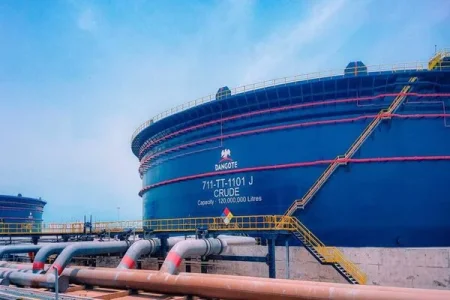
Dangote Refinery seeks billions of dollars to import crude oil, aiming to reach full capacity of 650,000 barrels per day by 2025. The refinery’s success could lower local fuel costs, boost competition in Europe, and help de-risk European oil supply chains. Failure to address refinery issues may lead to unrest.
Aliko Dangote’s refinery is in talks with foreign banks, including the Africa Finance Corporation (AFC), to secure billions of dollars needed for crude oil importation. This financial effort aims to help the Dangote Refinery reach its full capacity of 650,000 barrels per day.
According to the Financial Times, the refinery requires additional crude oil to operate at full potential, which is expected to be achieved by 2025. Experts from the Knightsbridge Strategic Group (KSG) have predicted that once the refinery is at full capacity, it will lead to significant reductions in local fuel prices and increased competition in the European market. This shift could potentially help European nations reduce their dependency on Russian oil.
The completion of the Dangote Refinery is expected to mark a new era in Nigeria's oil industry, where the country can begin exporting refined oil, which would relieve European nations’ oil supply chains. This transition could impact global oil markets and help mitigate the consequences of rising fuel prices.
However, experts warn that if Nigeria’s government fails to resolve its refinery challenges, it could lead to political instability and civil unrest, especially if fuel subsidies are removed, further burdening Nigerian citizens who are already struggling with rising fuel costs. The Dangote Refinery’s completion is crucial to stabilizing Nigeria’s fuel market and providing long-term economic benefits.




![[VIDEO] JTB Launches Online Portal to Retrieve Tax ID Using NIN or CAC Number](/data/attachments/226/226843-3196ce9f44e63ded65911a383d3fd36d.jpg?hash=lpL_EKlik3)